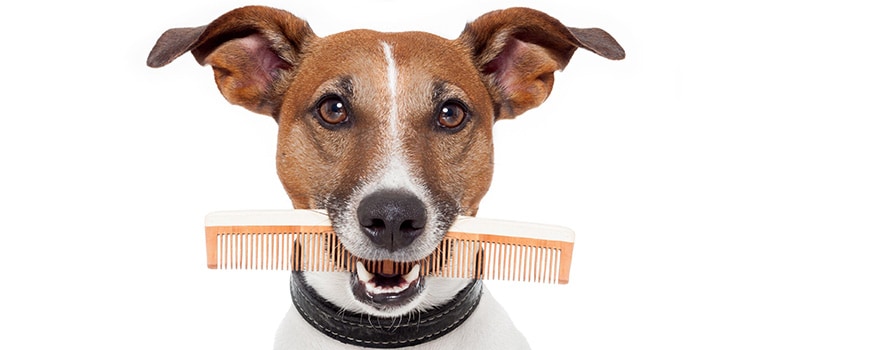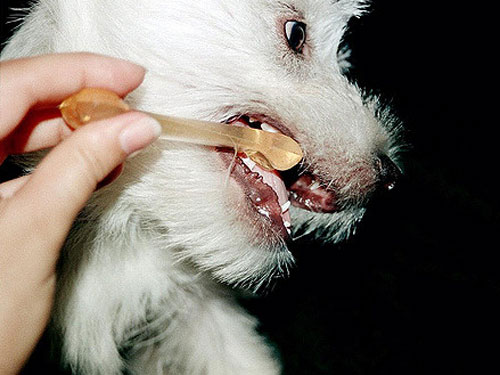As a conscientious Norwich Terrier owner, you will need to regularly care for your dog’s teeth throughout their entire life.
Retained Primary Teeth: often a young dog will not naturally lose their puppy or baby teeth without intervention from a licensed veterinarian. Therefore, keep a close watch on your puppy’s teeth around the age of 6 or 7 months of age to make certain that the baby teeth have fallen out and that the adult teeth have space to grow in.If your Norwich puppy has not naturally lost all their baby teeth, any remaining teeth will need to be pulled in order to allow room for the adult teeth to properly grow in, and the best time to do this will be the same time as they visit the veterinarian’s office to be spayed or neutered.
Periodontal Disease
Please be aware that 80% of three year old dogs suffer from periodontal disease and bad breath because their owners do not look after their dog’s teeth. What makes this shocking statistic even worse is that with simple, daily care it is possible to entirely prevent canine gum disease and bad breath.
The pain associated with periodontal disease will make your dog’s life miserable, as it will be painful for them to eat and the associated bacteria can infect many parts of the dog’s body, including the heart, kidney, liver and brain, all of which they will have to suffer in silence.
If your Norwich Terrier has bad breath, this could be the first sign of an unhealthy mouth and gum disease caused by plaque build-up on the teeth. As well, if your dog is drooling excessively, this may be a symptom secondary to dental disease. Your dog may be experiencing pain or the salivary glands may be reacting to inflammation from excessive bacteria in the mouth.
If you notice your Norwich Terrier drooling, you will want to have her professionally examined at your veterinarian’s office.
Brushing the Teeth
Slowly introduce your Norwich Terrier to teeth brushing early on in their young life so that they will not fear it.
Begin with a finger cap toothbrush when they are young puppies, and then move to a soft bristled toothbrush, or even an electric brush, as all you have to do is hold it against the teeth while the brush does all the work. Sometimes with a manual brush, you may brush too hard and cause the gums to bleed.
Never use human toothpaste or mouthwash on your dog’s teeth because dogs cannot spit and human toothpaste that contains toxic fluoride will be swallowed. There are many flavored dog toothpastes available at the pet store or veterinarian’s office.
Also it’s a good idea to get your dog used to the idea of occasionally having their teeth scraped or scaled, especially the back molars which tend to build up plaque. Be very careful if you are doing this yourself because the tools are sharp.
If you need help keeping your dog’s mouth open while you do a quick brush or scrape, get yourself a piece of hard material (rubber or leather) that they can bite down on, so that they cannot fully close their mouth while you work on their teeth.
When your dog is a young puppy, take the time to get them used to having their mouth handled and your fingers rubbing their teeth and gums.
Next, buy some canine toothpaste at your local pet store specially flavored to appeal to dogs and apply this to your dog’s teeth with your finger.
Then slowly introduce the manual or electric toothbrush to your Norwich Terrier. When you go slowly, they will get used to the buzzing and vibrating of the electric brush, which will do a superior job of cleaning their teeth.
First, let them see the electric brush, then let them hear it buzzing, and before you put it in their mouth, let them feel the buzzing sensation on their body, while you move it slowly toward their head and muzzle.
When your Norwich will allow you to touch their muzzle while the brush is turned on, the next step is to lift their lip and quickly brush a couple of teeth at a time until they get used to having them all brushed at the same time.
Always happily praise them for allowing you to brush their teeth, especially when they are first getting used to the idea.
Another simple home solution for helping to keep your dog’s breath fresh and their teeth white is Bicarbonate of Soda (baking soda). Simply sprinkle some into a dish and dip your finger or toothbrush first in water and then into the Bicarbonate of Soda. Then use this to clean your dog’s teeth and massage their gums. Some dogs seem to object less to this procedure when you use your finger.
Whether you let the electric toothbrush do the work for you, or you are using your finger or a manual toothbrush, make certain that you brush in a circular motion and when using a brush, angle the bristles so that they extend underneath the gums to help prevent plaque buildup, gum disease and loose teeth.
Teeth Scaling
Use of a tooth scraper or scaling tool once or twice a month can help to remove plaque buildup. Most accumulation will be found on the outside of the teeth and on the back molars, near or underneath the gum line. Go slowly and carefully because these tools are sharp and only do this when your dog is calm and relaxed, a little bit at a time.
Healthy Teeth Tips
Despite what most dog owners might put up with as normal, it is not normal for your dog to have smelly dog breath or canine halitosis. Bad breath is the first sign of an unhealthy mouth, which could involve gum disease or tooth decay. The following tips will help keep your Norwich Terrier’s mouth and teeth healthy:
Hydrogen Peroxide — keep your dog’s teeth sparkling white and their breath fresh by using old-fashioned hydrogen peroxide as your doggy toothpaste. Hydrogen peroxide is what’s in the human whitening toothpaste. There will be such a small amount on the brush that it will not harm your dog, and will kill any bacteria in your dog’s mouth.
Toothpaste : many canine toothpastes are formulated with active enzymes to help keep tartar build-up at bay.
Plaque and Halitosis : help prevent tooth plaque and doggy halitosis by feeding your dog natural, hard bones at least once a month, which will also help to remove tartar while polishing and keeping their teeth white.
Bones: feed large bones so there is no danger of swallowing, and do not boil the bones first because this makes the bone soft (which defeats the purpose of removing plaque), and boiling could cause bones to splinter into smaller pieces that could create a choking or puncturing hazard for your Norwich.
Dental Chews: feed a daily dental chew or hard biscuit to help to remove tartar while exercising the jaws and massaging the gums. Some dental chews contain natural breath freshening cinnamon, cloves or chlorophyll.
Coconut Oil: helps to prevent smelly dog breath while giving your dog’s digestive, immune and metabolic functions a boost at the same time. Dogs love the taste, so add a quarter of teaspoon to your dog’s dinner and their breath will soon be much sweeter.
Teeth Brushing: keep your Norwich Terrier’s mouth comfortable and healthy by getting into the habit of brushing their teeth every night before bedtime.

